Part I: 1997.
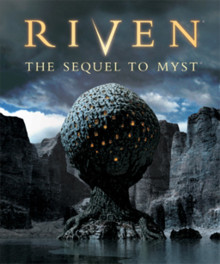
I first played Riven as a child around the time of its release. If you were not there, it's hard to explain just how mindblowing it was at that time.
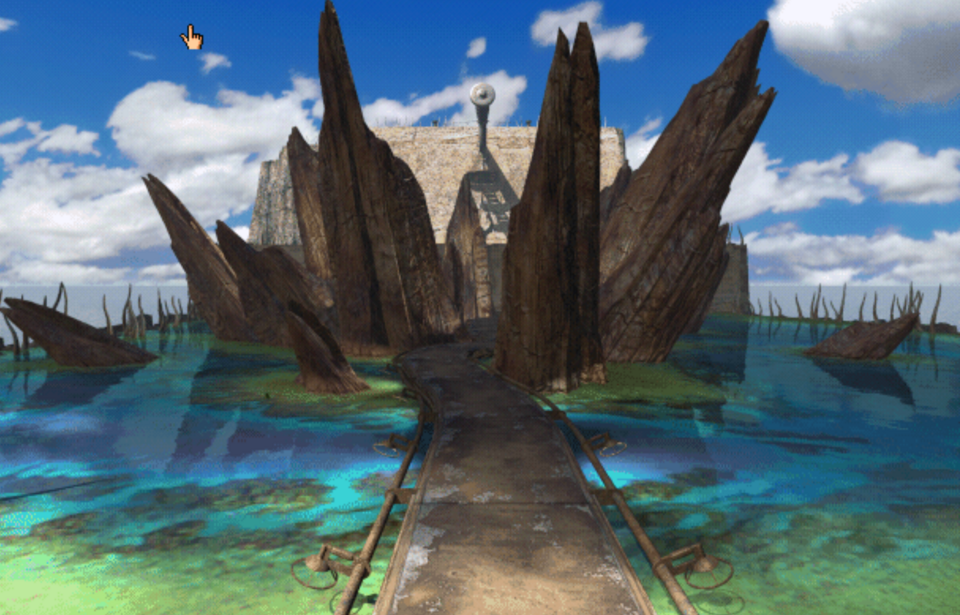
The convincing FMV actors. The roller-coaster like maglev rides. The Star Wars-like animals you can (kind-of) interact with.
What really sticks out in my memory is all the religious iconography.
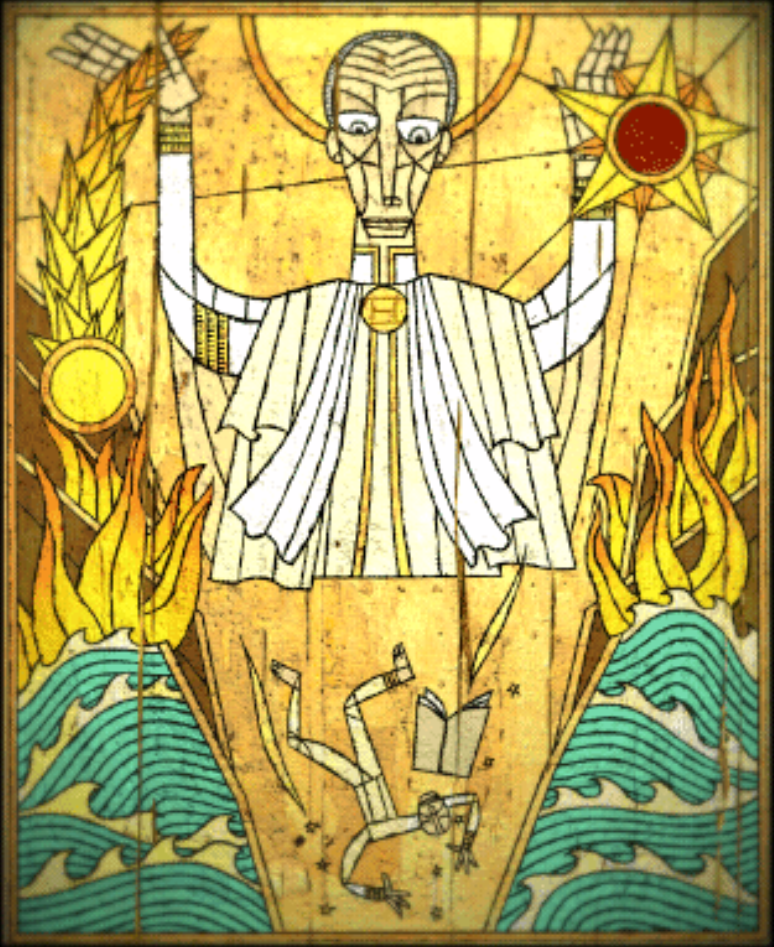
It's hard to put into words the effect this had on me. The island is so beautiful, but this is the first inkling that something is deeply wrong here. Someone has taken on power that no human should have. Someone is playing God. And God is wrathful.
And so, I wandered. I clicked on a lot of things. I went on more maglev and mine cart rides. I changed disks, a lot. I clicked on more things. I clicked on a lot of things that didn't seem to do anything. It was thrilling. But eventually, I was despondent. Nothing I did seemed to make any difference.
I moved on. As did, presumably, the majority of the 5 or so million people who played this.
—
I returned to Riven over the last few days. Hearing about the remake brought back a flood of memories. This time I was determined to finish it. I would once again immerse myself in this world. I would solve all the mysteries myself. I have an adult's brain now, after all.
Well, I succeeded. Kind of.
Part II: The bullshit.
There are basically three kinds of puzzles in Riven.
1. Just keep clicking.
This is most of the puzzles. You just keep trying the different combinations of things and seeing what happens. Eventually you get through. Does it make sense? Well, only kind-of. But at that point you're past it and you can move on without thinking too deeply.
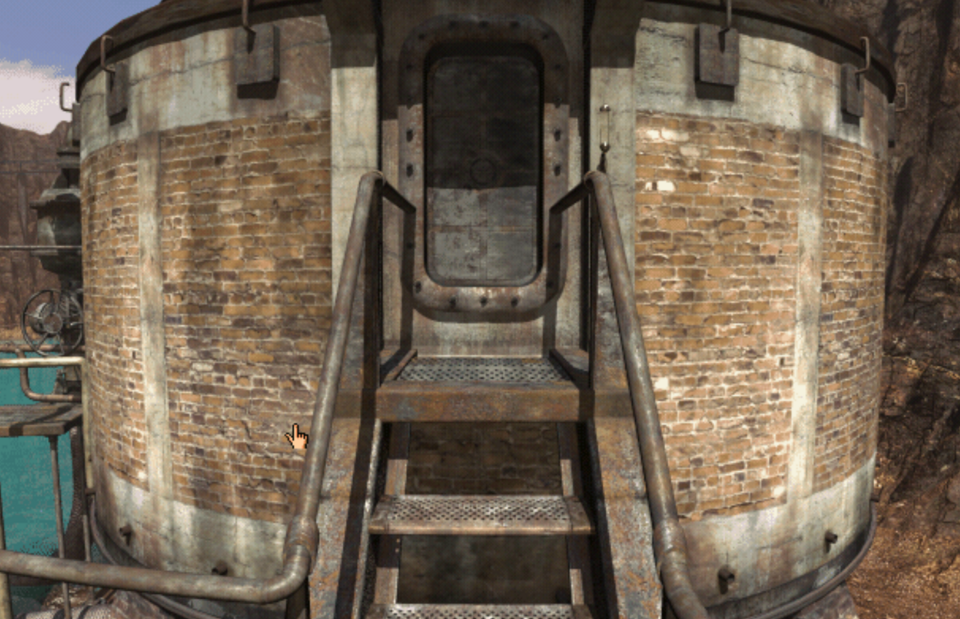
2. That one thing you didn't notice.
There's no puzzle, really. Just keep looking around. Did you miss it? Well, have fun traversing hundreds of random random other places for hours without making any progress. Riven's not going to call your attention to it.
Riven doesn't care if you found it or not, because Riven is a real place.
3. Some really obscure hint.
I'm looking at you, animal puzzle. If you've played the game, you know what I am talking about. Getting the right idea isn't hard, but executing it is a different story.
But actually, I'm not giving Cyan enough credit. There is one more:
4. The epiphany.
This is the gold standard of puzzle design, the aha moment every adventure game creator wants their audience to have. And Riven succeeded here, in some moments. Surprisingly, the infamous Fire Marble puzzle was actually in this category - I was able to put this together myself. (Well, kind-of. I had to cheat a little even though I had the right idea.) As was the numeral system - I felt like a real archaeologist when I figured that out.
But ultimately, it's the bullshit puzzles that keep you stuck for hours. And so if you're going in completely blind, the vast majority of your time will be spent with the bullshit. By the nature of this kind of game design, the worst aspects of the game are the ones you spend the most time on.
But there is a reason for these choices. It comes down to Cyan's game design philosophy.
Part III. The Three Schools of Puzzle Design
There is a baseline question to every puzzle game, one that the developer must answer, at least to themselves, to determine the whole scope of the adventure.
Who made all these damn puzzles?
And there are essentially three answers.
1. The Zelda answer: Don't ask. It's just a video game.
A Zelda game won't ask you to consider why someone made all these simple lock and key puzzles. That would be like asking why characters wait until their turn to attack in a JRPG, or why characters keep repeating the same lines. It's just how the medium works. Don't sweat it bro.
You might argue that it's metaphorical. On some level you don't believe that your spiky haired JRPG dude is just standing around waiting for their turn - you know this is supposed to represent a battle in the same way a simple cardboard background is supposed to represent a room in a play. Similarly, you can think of the puzzles as representing some sort of challenge the hero must go on. In terms of story, there's nothing more to it than that.
2. The Portal answer: Some mad genius made them to test your understanding.
This is the most straightforward: Somebody has made a series of challenges for you. It has the basic advantage that you know what is a puzzle and what is not a puzzle. This was one of the major conceits of "The Witness", which in many ways seems like a response to games like Riven. You get all the ephiphanies with none of the bullshit. There aren't as many red herrings to distract you, like switches that do nothing or cryptic clues. It's abstract and pure. You know the rules. Well, except when you don't.
3. The Riven answer: There are no puzzles. Just a world that you don't understand yet.
The world exists as it is - it wasn't built for you. It's a real place. If you see some interesting art or a strange contraption, you don't get to assume that it's part of a puzzle. Why would you? In real life, nobody would think this way. You would ask yourself who made this, and why? You wouldn't ask yourself what is the puzzle clue? Because the real world is not made up of puzzles. The real world is made up of people, and places, and science, and language.
This is by far the most difficult of the three to pull off. It's a video game attempting to transcend beyond being a video game, and create the feeling of verisimilitude, of being real. But the thing is, it's not real, and in fact it's still a video game. So this is walking a tight rope. We'll make a puzzle, but we can't make it seem like a puzzle. We can give you a clue to it, but we can't make it seem like a clue. Because puzzles and clues don't exist. But of course, that's a puzzle, and that's a clue. It's antithetical to the Nintendo school, which emphasizes clarity over everything. Nintendo never wants you to be confused. Cyan is OK with you being confused!
In Riven, everything in the world makes sense - at least if you take the time to soak up all the details and read all the lengthy journals. For every switch, lever and mysterious contraption, there is some reason for it, and some particular person who made it.
In a Nintendo game, you can ask why the designer made a particular room, but you aren't allowed to ask what character made it. In Riven, it's the opposite. You can ask who made this, and why, but in some sense, you're not allowed to ask why Cyan put it there and what it accomplishes in gameplay terms. I mean, you can certainly ask, but it might not have an answer!
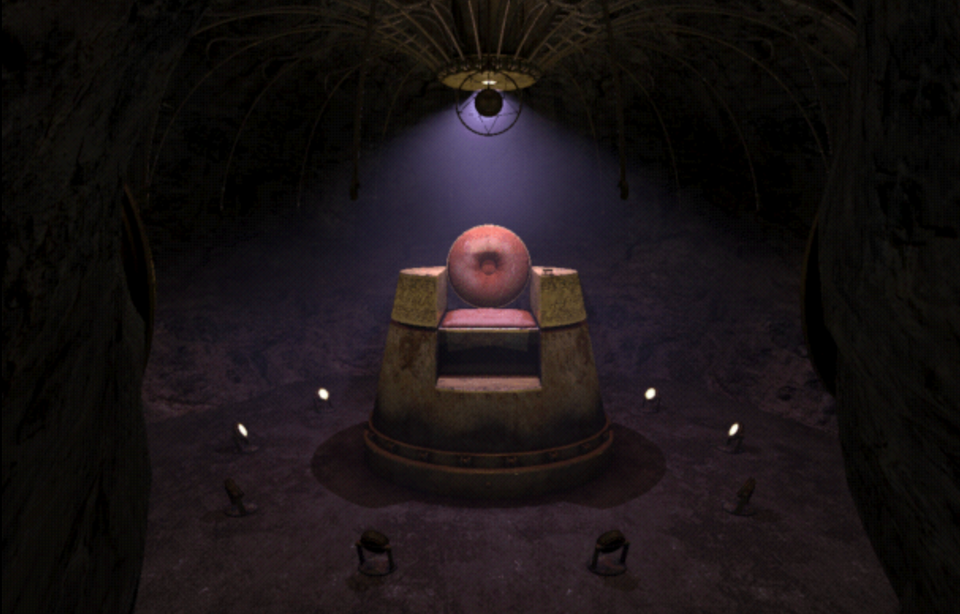
But this is where things get tricky, because you will ask this question, and you have to ask this question. Because again, even though it's real, and it's not a video game - it's not real, it's a video game. And in a video game, the player needs some damn clues.
Design philosophies (1) and (2) have the virtue of clarity. (3) does not. Again and again, the conceit of reality runs smack into the limitations of game design. The two notions are almost antithetical to each other. After all, the villain Gehn didn't design this world for you to succeed. Gehn has his own designs for the world and you're an intruder.
What this means in terms of gameplay is there are red herrings. There are a lot of red herrings. Some of the red herrings are actually clues of some form, but not in the form you are expecting.
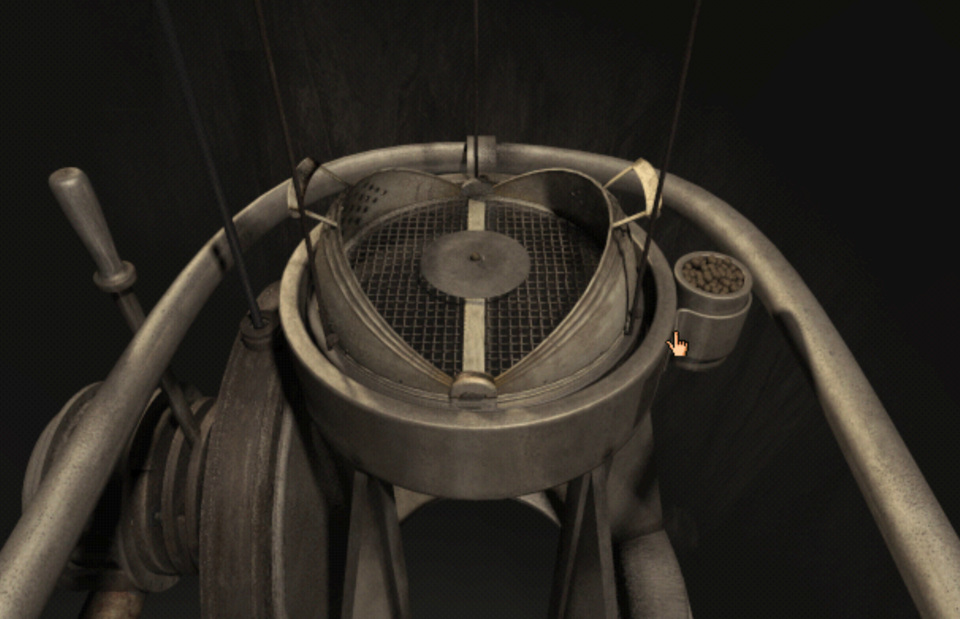
The upshot of this is that you will spend a lot of time wandering around seemingly accomplishing nothing. You're going to click on the same things over and over hoping it will do something different, and it won't. Because it's not there for you. It's there for Gehn.
Part IV: 2024.
So where, then, do I stand on Riven? As you know from the title of this post, I think it's a masterpiece. The narrative is thoroughly compelling. Gehn is one of the greatest villains of any game, because he is so coldly cruel and narcissistic in a thoroughly believable way. You don't have to look far to see his real-world equivalents. You could certainly argue that Riven is a game about colonialism and white supremacy. Gehn believes that the Rivenese people are incapable of self-governance and incapable of The Art (of bookmaking.) Only He can save them from their own violent, savage ways, and if that means sacrificing one or two or a hundred of them for his plans, so be it. He created this world, and he can destroy it if it suits his goal of a higher civilization. Only he didn't create it - he merely found it, as Atrus tells the story. Similarly, Cyan continues to contend that they didn't create Riven. They discovered it.
So do I recommend Riven? Absolutely. But you should know that, almost as an inevitable consequence of Cyan's design philosophy at the time, there are going to be a lot of bullshit puzzles and you're going to get frustrated. I *really* wish I could tell you to go in completely blind. That's what I would recommend for Outer Wilds, for example. But chances are, you're not going to have an ideal experience. So I'd recommend using a guide at times. This is a nice light-weight one that will help put you back in the right direction if you're really stuck. But don't go to it too fast. As a rule of thumb, I probably waited until I was thoroughly stuck for at least half-an-hour to an hour before reaching for help. Not everything is bullshit in Riven - there are some solid puzzles here that create a deep sense of accomplishment. But at some point, you're just not going to notice that one thing you can click on to progress, or not pick up on that overly-subtle clue.
The Steam ScummVM version worked remarkably well for me, with none of the bugs or crashes I would expect from a PC game of this age. But in some ways it's still held back by 1997 limitations. In particular, the lack of free perspective can be very frustrating. At times it's really difficult to see how things connect to each other because you are moving from one still image to another and you just can't quite get the right perspective. At other times you are limited by the low resolution - there's one puzzle you could completely skip over if you could just see a little better.
So, it's very possible that the remake will fix many of these issues. I thought about just waiting. But I really wanted to finish what I had started 27 years ago and scratch that particular itch that had been lurking in some dark corner of my brain since childhood. And I succeeded. With a little help.
One question remains: Which is the superior school of puzzle design?
I may have exaggerated when I implied that The Third School inevitably leads to frustration. It's possible to do this well. Riven does it well, at times. And Outer Wilds does it extremely well. So I'm not giving up on this tradition. But even Outer Wilds has many of the same problems as Riven - often sending you down forking garden paths to nowhere. I think it's difficult to pull this off, and I still see it as an open problem to solve for future designers. But despite all of the pitfalls, The Third School is still my favorite approach, because it draws you into the game world like no other way does. You will click, you will cry, but eventually, you might learn. It needs a steady hand and a lot of playtesting, but it's totally possible to make games like this that don't have too many bullshit puzzles. And when it works, it's masterful.

Log in to comment